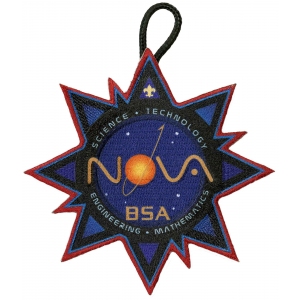![]()
This module is designed to help you explore how genetic information affects your life every day. It is part of the Science category.
- Choose A or B or C and complete ALL the requirements.
- Watch not less than three hours total of shows or documentaries
that discuss genetics and/or genomics. Then do the following:
- Make a list of at least five questions or ideas from the show(s) you watched.
- Discuss two of the questions or ideas with your counselor.
Some examples include—but are not limited to—shows found on PBS (NOVA: "Cracking the Code"), Discovery Channel, Science Channel, National Geographic Channel, and TED Talks (online videos). You may choose to watch a live performance or movie developed by a local museum or state or federal agency. You may watch online productions with your counselor's approval and under your parent's supervision.
- Read (not less than three hours total) about genetics or genomics.
Then do the following:
- Make a list of at least five questions or ideas from each article.
- Discuss two of the questions or ideas with your counselor.
Examples of magazines include—but are not limited to—Odyssey, Popular Science, Science Illustrated, Natural History, Scientific American, Nature Conservancy, Sage, and Smithsonian. Books might include The Immortal Life of Henrietta Lacks or The Gene: An Intimate History.
- Do a combination of reading and watching (not less than three hours
total). Then do the following:
- Make a list of at least two questions or ideas from each article or show.
- Discuss two of the questions or ideas with your counselor.
- Watch not less than three hours total of shows or documentaries
that discuss genetics and/or genomics. Then do the following:
- Complete one merit badge from the following list. (Choose one that you
have not already used toward another Nova Award.) After completion, discuss
with your counselor the genetic component of the merit badge you selected.
Animal Science Insect Study Public Health Bird Study Mammal Study Reptile and Amphibian Study Forestry Medicine Veterinary Medicine Gardening Nature - Complete two of the following activities:
- Teach the basics of genetic inheritance to your patrol (or similar group), using gummy bear genetics or a similar method.
- Helpful Link—Making Mendel's Model Manageable: www.nsta.org/publications/news/story.aspx?id=51651
- Extract DNA from saliva, strawberries, or a banana.
- Grow at least three generations of pea plants and explain the inheritance patterns. Helpful Link: http://science.lovetoknow.com/life-sciences/gregor-mendels-pea-plant-experiment
- Create a three-dimensional model of DNA and explain how it leads to the production of proteins.
- Present a report of at least 800 words or 10 minutes (with visual aids)
on one of the following opics. Make sure to include the ethical issues involved
in your topic. If possible, present our report to your unit or another group
in addition to presenting to your counselor.
- Mendelian inheritance, DNA, RNA, genetics, genomics, sequencing, and Punnett squares
- Genetic diseases, personalized medicine, and genetic counseling
- Genetically modified food, transgenic animals, and hybrid foods
- Use of large genetics databases for forensic analysis/solving crimes, genealogical research, or medical studies (The Cancer Genome Atlas (TCGA), Catalogue of Somatic Mutations in Cancer (COSMIC), Exome Aggregation Consortioum (ExAC), 100,000 Genomes Project, mitochondria! DNA, etc.)
- Pharmacogenetics and oncogenomics
- Human Genome Project
- CRISPR (Clustered Regularly-Interspaced Short Palindromic Repeats)
- Biotechnology, biologics, and biosimilar drugs
- Another related topic approved by your counselor in advance
- Visit a place where genetic and genomic information is being used, e.g., a biotechnology company or research lab, genetic counselor, a physician's office, crime lab, zoo, natural history museum, farm, hatchery, nursery/greenhouse, etc. Discuss the work done there with one (or more) of the employees. Find out how they are using genetic information, how it has changed their work, and what they look forward to in the future.
- Discuss with your counselor how genetics and genomics affect your everyday life and how you think it will affect your life in the future.
Counselor Notes:
Some resources that may prove useful are listed below.
- National Institute of General Medical Sciences: www.nigms.nih.gov/Pages/default.aspx
- Your Genome—Organisms That Have Had Their Genomes Sequenced: www.yourgenome.org/facts/timeline-organisms-that-have-had-their-genomes-sequenced








